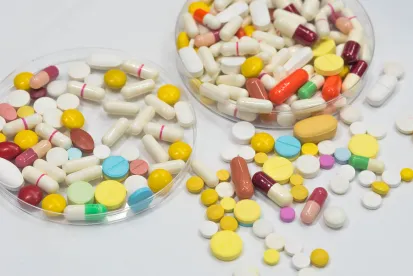A generic pharmaceutical distributor, Acetris Health, LLC, has challenged the Final Determination of U.S. Customs and Border Protection (“Customs”) that Acetris’ generic prescription drug, Rosuvastatin Calcium Tablets (“Rosuvastatin”), is a product of India, the place where the active pharmaceutical ingredient (“API”) is produced. If successful, the challenge in the U.S. Court of International Trade (“CIT”) could have a meaningful impact on decisions about where to manufacture API for the very broad range of drug products sold to the U.S. Government.
In general, the Trade Agreements Act of 1979 (“TAA”) requires companies selling to the government to supply end products that originate from the United States or a designated country when a contract is valued at a certain amount (typically, $180,000). For the purposes of the TAA, an item is manufactured either (a) where it is wholly manufactured, or (b) where it is “substantially transformed” into the end product, even if its component parts were manufactured elsewhere. See 19 C.F.R. 177.22(a); see also 19 C.F.R. 134.35; FAR 52.225-5. The important question of where a product is “substantially transformed” is a complex and fact-specific one and manufacturers often look to Customs to resolve uncertainty. See 19 C.F.R. 177.21 et. seq.
In July 2017, Acetris sought a Customs determination regarding whether Rosuvastatin is a U.S.-made end product manufactured in the U.S., and, separately, whether the product is substantially transformed in the U.S. under the TAA. Acetris emphasized the “complex, expensive and time consuming nature” of the post API processing in the U.S., explained that FDA regulations prohibited it from selling the API directly to the public, and noted that the processing costs incurred in the U.S. were significantly higher than the cost of purchasing the API manufactured in India.
Last month, Customs determined Rosuvastatin to be a product of India, where the API was produced, consistent with the view Customs has held for over 25 years in determinations concerning pharmaceutical products. Specifically, Customs has historically looked to the API’s place of manufacture to determine the country of origin under the TAA. See, e.g., Headquarters Ruling Letter (“HQ”) H215656, dated January 11, 2013. Customs then found the tablets were not substantially transformed in the U.S. because the imported API “retains its chemical and physical properties upon processing in the United States,” and thus the API did not undergo the change in name, character, or use required for a substantial transformation to have occurred. Customs went on to say that “[i]ncreasing the stability of the API and standardizing its concentration do not change the API,” and that “the processing performed in the United States does not affect the medicinal use of the API.” Again, this conclusion is consistent with Customs’ past decisions that evaluate a potential substantial transformation of the API by generally examining the processing in the non-API producing country to determine if there has been a change in chemical composition, name, or use of the product. See, e.g., HQ 562889, dated January 21, 2004 (determining that subsequent production operations such as adding excipients, mixing, and encapsulating the bulk API in microgranules to aid proper absorption do not substantially transform the API).
In its recent complaint, Acetris advances three challenges to the Customs determination:
-
Acetris argues that the complex, time consuming, and expensive processing that occurs in the U.S. and that is required by regulation to sell Rosuvastatin overcomes the significance of the source of the API itself. Acetris maintains that this extensive processing that changes the safety, efficacy, and pharmacokinetics of the API renders Rosuvastatin substantially transformed in the U.S.
-
Acetris argues that Rosuvastatin is manufactured in the U.S. because every manufacturing step identified in the ANDA and required by the FDA to convert the API and other active and inactive ingredients into a consumer drug product occurs in the U.S. Under Acetris’ view, there is no requirement under the applicable provisions in the FAR that U.S.-made end products must be “wholly manufactured” in the U.S. (i.e., the “wholly manufactured” language applies only when determining whether products are manufactured in a TAA-compliant country that is not the U.S.).
-
Acetris also challenges Customs’ authority to make U.S. origin determinations for TAA compliance purposes (as opposed to designated foreign country determinations) and, therefore, argues that such decisions are without legal effect and remain non-binding.
This case involves a question with which pharmaceutical companies have long grappled. What processing, packaging, or other activities within the U.S. or a TAA-designated country are sufficient to constitute substantial transformation of API produced elsewhere? Is it enough that certain inactive ingredients may be necessary to convert API into a product safe for consumers? Customs has repeatedly drawn a bright line in this determination by maintaining a high bar for showing that post-API processing can result in substantial transformation. If Acetris’ substantial transformation argument is successful, it is possible that Customs will be required to get further into the technical minutiae of the impact of the addition of adjuvants, excipients, intermediates, and other inactive ingredients as well as various processing steps to assess whether a substantial transformation has occurred. Such a change will make country of origin determinations even more fact-specific and difficult for manufacturers to make with confidence without seeking guidance from Customs.
Notably, the CIT has never decided a TAA challenge to a substantial transformation determination for a pharmaceutical product. Indeed, just two years ago the CIT reviewed the test for a substantial transformation under the TAA for the first time in Energizer Battery, Inc. v. U.S., 190 F. Supp. 3d 1308 (C.I.T. 2016). Given the novelty of the issue for the CIT, the Court in Energizer looked to interpretations of substantial transformation in other Customs cases involving country-of-origin determinations, which it is likely to do in Acetris’ case. However, the Energizer decision did not address what type of “change in character” in the U.S. would render a product substantially transformed in the U.S., potentially leaving Acetris’ challenge with a question of first impression for the CIT. Further, although Energizer did not directly question Customs’ authority to make determinations about U.S. origin products, the CIT at least implicitly assumed Customs had such authority when it affirmed Customs’ determination that that Energizer’s manufacturing of flashlights in the U.S. did not substantially transform the predominantly-Chinese components into a U.S. origin product.
The CIT’s decision will be an important one for the life sciences industry as the ability to manufacturer API in key non-designated countries such as China, India, and Brazil is an important consideration in supply chain decision making. Further, a change or refinement of the substantial manufacturing test may impact manufacturers of any products sold to the Government, across all industries. It will be interesting to watch if any manufacturers — whether of drug products or other items — become involved as amicus curiae in this challenge. Indeed, given the potential impact that the CIT’s decision could have on all contractors that sell to the U.S. Government under TAA-covered contracts, companies would be well advised to closely follow the developments of this challenge and any resulting changes to the “substantial transformation” standard.






 />i
/>i

